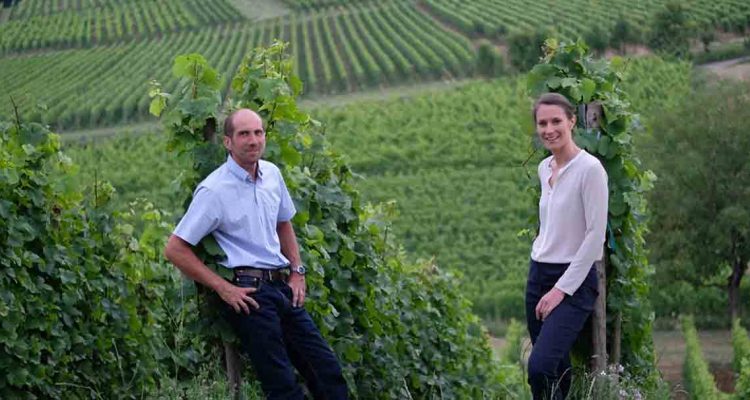(Click here to read Alsace – Part 1)
(Click here to read Alsace – Part 2)
Seriously, can you think of anything you can do today that people enjoyed in the 1500s? Drinking the wines of Domaine Emile Beyer is the only thing that comes to my mind. This winery in Alsace, France has been a family estate since the 1580s. Now the 14th generation is growing the grapes and making the wine: Christian Beyer and his wife Valérie.
I met Valérie on a (virtual) visit to Alsace this summer. Surprisingly, the northern French province of Alsace is one of the sunniest white wine-producing regions in all of France. Colorfully historic, this area is a collection of tiny, quaint villages. Protected on the west by the long chain of the Vosges Mountains, Alsace is bounded by the Rhine River to the east, and has miles of hillside vineyards stretching the length of the region, north to south.
The winemakers of Alsace established the first wine route in France nearly 70 years ago. Instead of merely driving its 105-mile length in a car, many people walk or cycle along sections of the wine route that follow the charming, rustic roads of this area.
The Emile Beyer winery is fortunate to be located in a dry microclimate in Eguisheim, near the city of Colmar. Today, the Beyer family has converted their lands to organic and biodynamic practices. “We are responsible for passing this along to future generations,” Valérie says. “As our ancestors did for us.”

This thoughtfulness toward the planet does not go unrecognized. According to Valérie, though she and her husband had worked organically for many years, they found that once they were officially certified organic in 2014, they saw an increase in exports.
Now these young winemakers are finding their vines have increased resilience with regard to climate change, and improved disease resistance. The vines are now capable of growing very deep roots, which Valérie explains allows them to make wines with more acidity. The vines also use the earth’s mineral salts and elements, which creates more complexity in the wines. Also, Christian and Valérie have shifted their domaine’s focus a bit, adding more of Alsace’s very desirable pinot noir to their vineyards.
In choosing winemaking, Valérie and Christian consider this to be not a job, but a way of life. They were thrilled that their six-year-old twins were able to spend so much time happily playing in the vineyards during the past year. Could this be heralding a 15th generation of Beyer family winemakers?
THE WINES
2019 Emile Beyer Riesling “Pfersigberg” — Notes of wild herbs, across between garrigue-like and spiced. On the palate strong grapefruit flavors tinged with additional citrus fruits. The grapes for this wine are grown in a steep Grand Cru vineyard with Jurassic limestone and poor soil, which imbues the wine with a complexity of herbs and citrus, Valérie Beyer explains.
2019 Emile Beyer Pinot Gris “Hohrain” – A fuller body than I expected, with fruit on the palate persisting into the lively, acidic finish tinged with salinity. According to Valérie Beyer, the grapes are grown in a very sunny location; the lieu-dit [locality] of Hohrain is the first place where the snow melts every spring. Here the soil has remnants of an ancient seabed, like some of the best vineyards in Burgundy, which contributes to the aromas and flavors of the wine.

